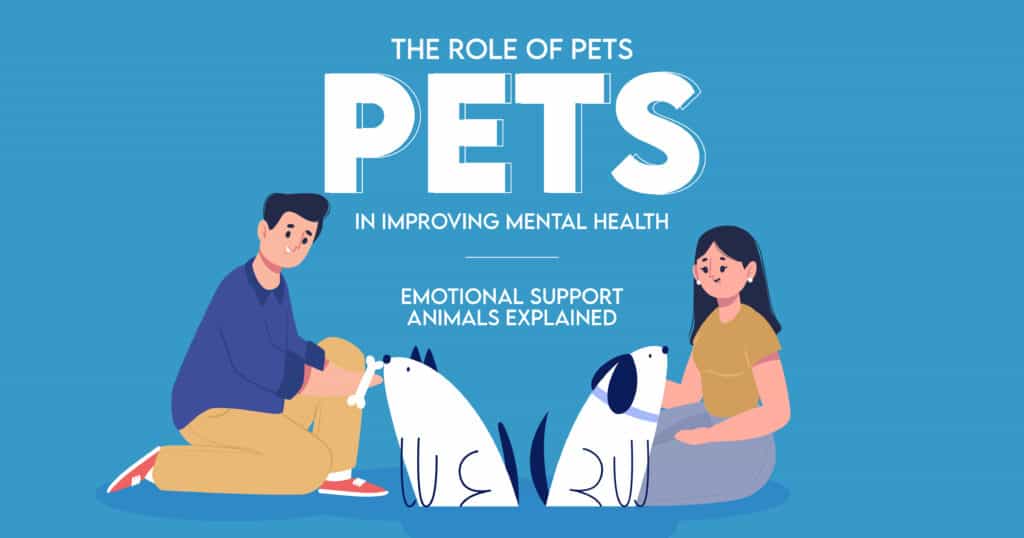If you’ve ever experienced the unconditional love of a pet, you already know that they can have a profound effect on your mood and well-being. Pets aren’t just furry companions; they can be powerful allies in our mental health journey. Among the many ways pets support mental well-being, Emotional Support Animals (ESAs) stand out as particularly significant.
Essential Takeaways
- ESAs Provide Emotional Support: Emotional Support Animals offer crucial emotional comfort and companionship, particularly beneficial for those with mental health conditions.
- Legal Protections: ESAs are protected under laws such as the Fair Housing Act and Air Carrier Access Act, allowing for accommodations in housing and travel.
- Proper Care is Key: To fully benefit from an ESA, proper care, routine, and training are essential. Ensuring the well-being of your ESA enhances the support they can provide.
But what exactly makes these animals so special, and how can they help those struggling with mental health issues? Let’s dive into the world of ESAs and uncover the remarkable role they play in enhancing mental health.
Understanding the Connection Between Pets and Mental Health
The Universal Appeal of Pets
From wagging tails to gentle purrs, pets have a way of bringing joy and comfort to our lives. Research consistently shows that the presence of animals can lower stress levels, reduce anxiety, and even enhance overall mood. This isn’t just a coincidence; animals have a unique ability to connect with us emotionally, often providing support when we need it most.
Pets offer companionship and a non-judgmental presence, which can be especially beneficial for those struggling with mental health issues. Their unconditional love and ability to provide comfort make them invaluable partners in managing mental well-being.
Overview of Emotional Support Animals
Emotional Support Animals are more than just pets; they are specially designated animals that provide emotional comfort and support to individuals with mental health conditions. Unlike service animals, which are trained to perform specific tasks related to a disability, ESAs provide support through their mere presence and companionship.
The Benefits of Pets on Mental Health
Reducing Stress and Anxiety
One of the most significant benefits of having a pet is the reduction of stress and anxiety. Studies have shown that interacting with pets can lower levels of cortisol, the hormone associated with stress. Just petting a dog or cat can lead to immediate relaxation and a decrease in anxiety levels.
Pets also provide a sense of routine and structure. Daily activities such as feeding, walking, and playing with a pet can create a sense of purpose and normalcy, which is particularly helpful for individuals experiencing anxiety or depression.
Enhancing Mood and Reducing Depression
Pets can be a powerful antidote to depression. Their presence encourages physical activity, which is known to release endorphins and improve mood. Regular exercise, such as walking a dog, helps combat feelings of lethargy and sadness that often accompany depression.
Moreover, the companionship of a pet can alleviate feelings of loneliness. Having an animal to care for and interact with can boost self-esteem and provide emotional support, which is crucial for those dealing with depressive symptoms.
Providing Comfort and Companionship
The comforting presence of a pet can be a great source of emotional support. Animals have a natural ability to sense when their owners are upset or stressed and often respond with comforting behaviors, such as cuddling or lying close to their owner. This physical contact and emotional connection can be incredibly soothing.
For many people, the companionship of a pet helps them feel less isolated and more connected. Pets offer a non-judgmental, empathetic presence that can help individuals feel valued and understood, which is essential for mental health.
What is an Emotional Support Animal (ESA)?
Defining Emotional Support Animals
An Emotional Support Animal is a type of pet specifically designated to provide emotional comfort and support to individuals with mental health conditions. Unlike service animals, ESAs do not perform specific tasks or services; their primary role is to offer emotional comfort through their companionship.
ESAs are prescribed by a licensed mental health professional, who provides documentation that states the individual’s need for an ESA. This documentation can be used to access certain accommodations, such as housing or travel, under specific legal protections.
Difference Between ESAs and Service Animals
It’s important to distinguish between Emotional Support Animals and service animals. Service animals are trained to perform specific tasks to assist individuals with disabilities, such as guiding the visually impaired or alerting individuals with seizures. Emotional Support Animals, on the other hand, do not require specialized training; their role is to provide emotional support and comfort.
Legal Definitions and Protections
In the United States, the Fair Housing Act (FHA) and Air Carrier Access Act (ACAA) provide protections for Emotional Support Animals. Under the FHA, individuals with ESAs are entitled to live with their animals in housing that might otherwise prohibit pets. The ACAA allows individuals to fly with their ESAs in the cabin of an aircraft, though airlines have specific guidelines and requirements.
It’s essential for ESA owners to be aware of these legal protections and to have proper documentation from a licensed mental health professional to ensure they can access these accommodations.
Who Can Benefit from an ESA?
Emotional Support Animals can benefit individuals with a wide range of mental health conditions, including:
- Depression: ESAs can provide comfort and companionship, helping to alleviate feelings of sadness and isolation.
- Anxiety: The presence of an ESA can help reduce anxiety levels and provide a calming influence.
- PTSD: ESAs can offer emotional support and stability for individuals coping with post-traumatic stress disorder.
- Phobias: An ESA can provide comfort and reassurance in situations that trigger intense fear or phobia.
Choosing the Right ESA
Matching Your Personality and Lifestyle
When selecting an Emotional Support Animal, it’s crucial to consider your personality and lifestyle. The right ESA should complement your daily routine and living situation. For example, a high-energy dog may be a good fit for an active person, while a more low-key cat might suit someone with a quieter lifestyle.
Considering Different Types of Animals
While dogs and cats are the most common ESAs, other animals can also serve as emotional support. Birds, rabbits, and even reptiles can provide comfort and companionship. The key is to choose an animal that fits well with your living environment and personal preferences.
Understanding ESA Requirements
Different animals have varying needs in terms of care, space, and exercise. It’s essential to be aware of these requirements and ensure you can meet them before adopting an ESA. For instance, dogs generally require regular exercise and grooming, while cats may need less intensive care.
How to Get an Emotional Support Animal
Consulting with a Mental Health Professional
The first step in obtaining an Emotional Support Animal is to consult with a licensed mental health professional. They will assess your mental health needs and determine if an ESA is appropriate for you. If so, they will provide a letter outlining your need for an ESA, which is crucial for accessing housing and travel accommodations.
Documentation and Certification
While there is no official certification for ESAs, a letter from a mental health professional is essential. This letter should include details about your mental health condition and the specific ways an ESA will help you. Be cautious of online services that claim to provide official ESA certification for a fee; legitimate ESAs are recognized based on the professional’s recommendation, not a certificate.
Understanding Your Rights and Responsibilities
As an ESA owner, you have specific rights under the Fair Housing Act and Air Carrier Access Act. However, you also have responsibilities, such as ensuring your ESA is well-behaved and does not disrupt others. Familiarize yourself with these rights and responsibilities to ensure a positive experience with your ESA.
Caring for Your Emotional Support Animal
Daily Care and Routine
Proper care is essential for maintaining the health and well-being of your ESA. This includes regular feeding, grooming, and exercise. Establishing a daily routine helps your ESA feel secure and contributes to their overall happiness.
Maintaining Your ESA’s Health
Regular veterinary check-ups are crucial to keep your ESA healthy. Ensure your animal is up-to-date on vaccinations and receives routine health screenings. Good health practices not only benefit your ESA but also enhance your experience as an owner.
Training and Socialization Tips
While ESAs do not require specialized training, basic obedience and socialization can be beneficial. Training your ESA to follow basic commands and behave appropriately in public settings helps ensure a positive experience for both you and those around you.
Resources and Support
Professional Organizations and Support Groups
Several organizations provide support and resources for ESA owners. These include mental health organizations, ESA advocacy groups, and local support networks. Connecting with these resources can offer additional guidance and community support.
Online Resources and Communities
Online forums and communities can be valuable for connecting with other ESA owners and sharing experiences. Websites dedicated to ESAs provide information, support, and a platform for discussing various aspects of ESA ownership.
Conclusion
Embracing the benefits of Emotional Support Animals can significantly enhance mental health and well-being. By understanding the role of ESAs, choosing the right animal, and providing proper care, individuals can experience the profound positive impact that these animals can offer. If you’re considering an ESA, reach out to a mental health professional to explore how an Emotional Support Animal could become a valuable addition to your mental health toolkit.
Are you ready to explore the benefits of having an Emotional Support Animal? Connect with a mental health professional today to discover how an ESA can support your mental well-being.
FAQs
1. What qualifies someone to have an Emotional Support Animal?
To qualify for an ESA, you must have a diagnosed mental health condition and obtain a recommendation letter from a licensed mental health professional stating that an ESA will help alleviate symptoms of your condition.
2. Can any pet be an Emotional Support Animal?
While dogs and cats are most common, other animals can also serve as ESAs. The key is to choose an animal that fits well with your lifestyle and living situation.
3. What are the legal rights of an ESA owner?
Under the Fair Housing Act and Air Carrier Access Act, ESA owners have the right to live with their animals in housing that may otherwise prohibit pets and to travel with their ESAs in the cabin of an aircraft.
4. How do I get my pet certified as an ESA?
There is no official certification for ESAs. Instead, you need a letter from a licensed mental health professional that outlines your need for an ESA.
5. Are there any restrictions on where ESAs can go?
While ESAs have specific protections for housing and air travel, they do not have the same access rights as service animals in other public places. Always check the policies of individual businesses or locations regarding ESAs.








